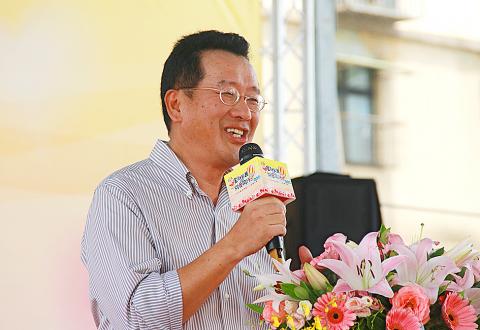Domestic institutions have for the most part taken steps to comply with Europe’s stringent data and privacy rules — the General Data Protection Regulation (GDPR) — that took effect on Friday, Financial Supervisory Commission (FSC) Chairman Wellington Koo (顧立雄) said the same day.
Most domestic financial firms are expected to be able to comply with GDPR as they have made the required preparations, Koo told reporters on the sidelines of a corporate governance event in Taipei.
However, some Taiwanese lenders would have to do more than their peers, Koo said, noting that the six state-run banks that have branches in Europe would have to appoint data protection officers who report to chief privacy officers and commit additional resources toward information and information transmission security.

Photo: CNA
State-run banks subject to the requirement are the Bank of Taiwan (臺灣銀行), Taiwan Cooperative Bank (合庫銀行), Mega International Commercial Bank (兆豐銀行), First Commercial Bank (第一銀行), Hua Nan Commercial Bank (華南銀行) and Chang Hwa Bank (彰化銀行).
Foreign banks with operations in Taiwan should easily be able to adjust to GDPR as they follow protocols set by their head offices, while domestic banks that do not have branches in Europe are still subject to GDPR if their business involve collecting personal data from residents in Europe, Koo said.
The GDPR helps clarify individuals’ rights to the personal data collected by companies around the world for targeted advertising and other purposes. It applies to all users in the EU, regardless of where the companies collecting, analyzing and using their data are located.
Violators could face fines of up to 20 million euros (US$24 million) or 4 percent of their annual global revenue, whichever is greater.
The National Development Council said the finance, e-commerce, airlines and transport industries are expected to see the greatest impact from the new rule.
The council has outlined plans to setup a cross-departmental platform to help Taiwan’s businesses cope with the new rule, Koo said.
It is hoped that financial companies would step up and share their experience with other industries in Taiwan, he said.
Koo also announced that next year financial institutions and listed companies would be required to staff corporate governance positions to help provide their board of directors with information and assistance.
Under the commission’s plans, financial institutions such as banks and insurance companies as well as listed firms with paid-in capital of NT$10 billion (US$333.95 million) or more are required to establish corporate governance posts as of next year.
About 120 companies initially will be subject to the requirement, but the requirement would be expanded to securities brokerages, futures houses and listed firms with paid-in capital of NT$2 billion in the second phase, the commission said.
Additional reporting by AP and staff writer

CHIP WAR: Tariffs on Taiwanese chips would prompt companies to move their factories, but not necessarily to the US, unleashing a ‘global cross-sector tariff war’ US President Donald Trump would “shoot himself in the foot” if he follows through on his recent pledge to impose higher tariffs on Taiwanese and other foreign semiconductors entering the US, analysts said. Trump’s plans to raise tariffs on chips manufactured in Taiwan to as high as 100 percent would backfire, macroeconomist Henry Wu (吳嘉隆) said. He would “shoot himself in the foot,” Wu said on Saturday, as such economic measures would lead Taiwanese chip suppliers to pass on additional costs to their US clients and consumers, and ultimately cause another wave of inflation. Trump has claimed that Taiwan took up to

A start-up in Mexico is trying to help get a handle on one coastal city’s plastic waste problem by converting it into gasoline, diesel and other fuels. With less than 10 percent of the world’s plastics being recycled, Petgas’ idea is that rather than letting discarded plastic become waste, it can become productive again as fuel. Petgas developed a machine in the port city of Boca del Rio that uses pyrolysis, a thermodynamic process that heats plastics in the absence of oxygen, breaking it down to produce gasoline, diesel, kerosene, paraffin and coke. Petgas chief technology officer Carlos Parraguirre Diaz said that in

Japan intends to closely monitor the impact on its currency of US President Donald Trump’s new tariffs and is worried about the international fallout from the trade imposts, Japanese Minister of Finance Katsunobu Kato said. “We need to carefully see how the exchange rate and other factors will be affected and what form US monetary policy will take in the future,” Kato said yesterday in an interview with Fuji Television. Japan is very concerned about how the tariffs might impact the global economy, he added. Kato spoke as nations and firms brace for potential repercussions after Trump unleashed the first salvo of

SUPPORT: The government said it would help firms deal with supply disruptions, after Trump signed orders imposing tariffs of 25 percent on imports from Canada and Mexico The government pledged to help companies with operations in Mexico, such as iPhone assembler Hon Hai Precision Industry Co (鴻海精密), also known as Foxconn Technology Group (富士康科技集團), shift production lines and investment if needed to deal with higher US tariffs. The Ministry of Economic Affairs yesterday announced measures to help local firms cope with the US tariff increases on Canada, Mexico, China and other potential areas. The ministry said that it would establish an investment and trade service center in the US to help Taiwanese firms assess the investment environment in different US states, plan supply chain relocation strategies and